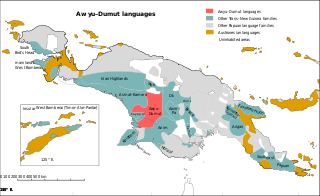The Sko or Skou languages are a small language family spoken by about 7000 people, mainly along the Vanimo coast of Sandaun Province in Papua New Guinea, with a few being inland from this area and at least one just across the border in the Indonesian province of Papua.

Western Province is a coastal province in southwestern Papua New Guinea, bordering the Indonesian provinces of Highland Papua and South Papua. The provincial capital is Daru. The largest town in the province is Tabubil. Other major settlements are Kiunga, Ningerum, Olsobip and Balimo.
The Left May or Arai languages are a small language family of half a dozen closely related but not mutually intelligible languages in the centre of New Guinea, in the watershed of the Left May River. There are only about 2,000 speakers in all. Foley (2018) classifies them separately as an independent language family, while Usher (2020) links them with the Amto–Musan languages.

The Trans-Fly – Bulaka RiverakaSouth-Central Papuan languages form a hypothetical family of Papuan languages. They include many of the languages west of the Fly River in southern Papua New Guinea into southern Indonesian West Papua, plus a pair of languages on the Bulaka River a hundred km further west.
The Kamoro language is an Asmat–Kamoro language spoken in New Guinea by approximately 8,000 people. Dialect diversity is notable, and Kamoro should perhaps not be considered a single language.
Tanah Merah is a town in South Papua province of Indonesia on the bank of Digul river, located some two hundred miles from Merauke within the interior of Western New Guinea. It is the administrative center of Boven Digoel Regency; administratively, it is covered by Persatuan kampung of Mandobo District.
The Koteka are seven major ethnicities of the highlands of Western New Guinea in Indonesia with a common culture: the Lani, Mee, Amungme, Moni, Damal, Yali and Nduga. The Koteka share their identity with other peoples in southern areas, such as the Muyu, Mandobo and Kamoro.

The Greater Awyu or Digul River languages, known in earlier classifications with more limited scope as Awyu–Dumut (Awyu–Ndumut), are a family of perhaps a dozen Trans–New Guinea languages spoken in eastern West Papua in the region of the Digul River. Six of the languages are sufficiently attested for a basic description; it is not clear how many of the additional names may be separate languages.
The Pauwasi languages are a likely family of Papuan languages, mostly in Indonesia. The subfamilies are at best only distantly related. The best described Pauwasi language is Karkar, across the border in Papua New Guinea. They are spoken around the headwaters of the Pauwasi River in the Indonesian-PNG border region.

The Turama–Kikorian languages are a family identified by Arthur Capell (1962) and part of the Trans–New Guinea languages (TNG) family in the classifications of Stephen Wurm (1975) and Malcolm Ross (2005). The family is named after the Turama River and Kikori River of southern Papua New Guinea; the alternative name is based more narrowly on the Omati River.

The Kamula–Elevala languages are a small family of the Trans–New Guinea languages spoken in the region of the Elevala River.

The Chimbu–Wahgi languages are a language family sometimes included in the Trans–New Guinea proposal.

New Guinea is the world's second-largest island, with an area of 785,753 km2 (303,381 sq mi). Located in Melanesia in the southwestern Pacific Ocean, the island is separated from Australia by the 150-kilometre wide Torres Strait, though both landmasses lie on the same continental shelf. Numerous smaller islands are located to the west and east.

The Yam languages, also known as the Morehead River languages, are a family of Papuan languages. They include many of the languages south and west of the Fly River in Papua New Guinea and Indonesian West Papua.
The Trans-Fly languages are a small family of Papuan languages proposed by Timothy Usher, that are spoken in the region of the Fly River.

Tabo, also known as Waia (Waya), is a Papuan language of Western Province, Papua New Guinea, just north of the Fly River delta. The language has also been known as Hiwi and Hibaradai.
Mandobo, or Kaeti, is a Papuan language of Mandobo District in Boven Digoel Regency, Papua, Indonesia.

Bim or Bimin is one of the Ok languages of New Guinea. It is spoken in Sandaun and Western Provinces in the region between the Murray and Strickland Rivers. The language is related to Faiwol but there is also "much intermarriage and cultural exchange with Oksapmin".
Proto-Trans–New Guinea is the reconstructed proto-language ancestral to the Trans–New Guinea languages. Reconstructions have been proposed by Malcolm Ross and Andrew Pawley.
The East Pauwasi languages are a family of Papuan languages spoken in north-central New Guinea, on both sides of the Indonesia-Papua New Guinea border. They may either form part of a larger Pauwasi language family along with the Western Pauwasi languages, or they could form an independent language family.










